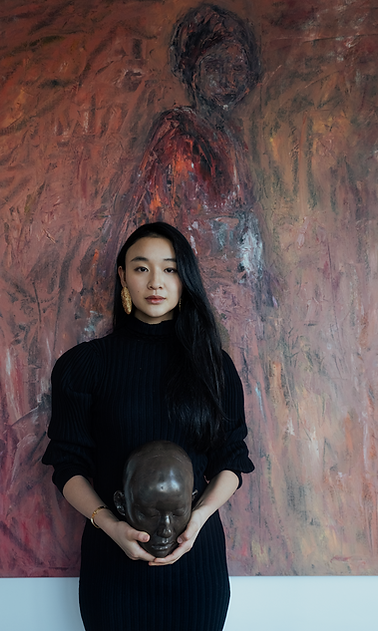
Mizuki Nishiyama is a mixed-Japanese artist based in Hong Kong whose practice bridges Eastern and Western traditions to explore identity, ancestry, and the fragile human condition through the lens of the female experience. Drawing from her Japanese, Hong Kong, and Italian heritage, she creates a hybrid visual language that transcends cultural boundaries while remaining grounded in material and philosophical depth.
Her work integrates East Asian materials and aesthetics—sumi ink, ancestral soil, burning, cutting, and sewing with contemporary Western techniques, engaging concepts such as wabi-sabi (the beauty of imperfection), ura (the hidden or shadowed), and yūgen (mysterious, profound beauty). These methods form a dialogue between body, environment, and memory, where natural elements act as both material and metaphor. Ancestral soil, excavated from her family’s land in Japan and tied to histories of purification and ritual, is a recurring presence in her paintings and tapestries.
In painting, Nishiyama incorporates this soil into pigments and cuts through viscous oils with knives, balancing violence and tranquility. In textile works, she buries and revives fabrics through fire, soil, teas, and traditional distressing techniques such as Sashiko and Boro, enacting cycles of life, death, and rebirth. Her ongoing series, Bodies in Landscape, expands on Zen ink traditions and Daoist philosophies of interdependence, situating the female body within nature as a site of trauma, resilience, and transformation.
Through this synthesis of material, philosophy, and cultural memory, Nishiyama’s work invites viewers into a poetic contemplation of impermanence, hybridity, and the enduring spirit of the human body in landscape.
Currently a PhD student at the Institute for Doctoral Studies in the Visual Arts (IDSVA), Nishiyama also holds an MFA from Central Saint Martins and a BFA from Parsons School of Design. Her solo exhibitions include Shunga (Whitestone Gallery, Hong Kong, 2020), An Exploration of Human Fragility: Love & Lust (Tenri Cultural Institute, New York, 2020), and 脆い Moroi: An Exploration of Human Fragility (Greenpoint Gallery, New York, 2019).